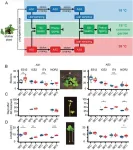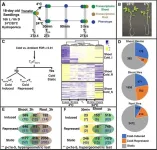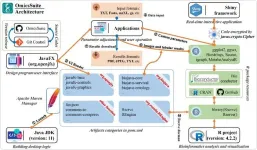(Press-News.org) A team of European researchers has developed a new test that can accurately measure biological aging in a clinical setting. The discovery was made while studying patients for the aging effects of chronic kidney disease.
The new test is an epigenetic clock – a type of biochemical assessment that looks at DNA to understand how well the body is aging in contrast to its chronological age – and is the first of these cutting-edge tests to be proven to perform accurately in a clinical setting, in both healthy and unhealthy tissue.
The work was led by a partnership between the University of Glasgow and the Karolinska Institutet, Stockholm, and is published in the Journal of Internal Medicine as part of a study into the aging effects of chronic kidney disease and its associated treatments.
The research team studied more than 400 patients with chronic kidney disease in Sweden alongside around 100 matched population controls, to better understand the impact on ageing of the disease, including during dialysis treatment and after kidney transplant. To do this, researchers used a range of tests including blood biomarkers, skin autofluorescence and epigenetic clocks. The team used the clocks to measure the change in biological age of around 47 patients one year after kidney transplantation, or one year after the start of their dialysis treatment, as well as how the healthy tissue in 48 controls aged by comparison.
The results showed that for patients with chronic kidney disease, their biological clock is ticking faster than the average person’s. This continues to be the case even after dialysis treatment. Indeed, patients’ biological clocks were only shown to slow down following a kidney transplant.
However, while the epigenetic clocks all showed a similar picture, the research team found that none of the current clocks could be shown to be accurate in a clinical setting, and all were found to be inaccurate to differing degrees when tested in healthy tissue over time.
To address this, the team developed a new, more accurate epigenetic clock – the Glasgow-Karolinska Clock – that works on healthy and unhealthy tissue. The results from this new clock matched what doctors saw in patients with chronic kidney disease, and also appeared to accurately assess healthy tissue too. This study is the first real-world test of epigenetic clocks in a normal ageing setting, and against clinical parameters.
As the body ages, a series of factors lead to epigenetic changes and loss of a chemical tag (DNA methylation) from your DNA. This is often associated with a range of disease common to ageing, such as chronic kidney disease, cancer and heart disease. Epigenetic clocks have been proposed as a ’gold standard’ for measuring age accurately, beyond a person’s biological age, as they are able to measure methylation tags on DNA.
Professor Paul Shiels, lead author of the study for the University of Glasgow, said: “This study is the first time in a clinical setting that we can accurately report on the extent of biological as opposed to chronological ageing in chronic kidney disease patients. Our findings, using the new Glasgow-Karolinska Clock – show that not only are these patients aging faster than people in the general population, their accelerated aging only slows down once they have had a transplant. Treatment with dialysis does not appear to impact this process.
“This is also the first clinical test of epigenetic clocks, and the discovery that most are inaccurate when compared with medical evidence has led us to develop a new more accurate test which can accurately measure methylation tags on DNA of both healthy and unhealthy tissue. We have proven it is accurate to the high standards of a clinical setting.
“Methylation tagging of DNA is impacted by what we eat and also out gut microbiome. As a result, this new clock has real potential to be able to evaluate lifestyle interventions, including diet, that could benefit the public and help to address issues such as health inequalities.”
Peter Stenvinkel, Professor at Karolinska Institutet, said: “I found the new tool to estimate effects of interventions on biological age of much interest. The tool could be used to study treatment strategies in patients with end-stage kidney disease - a group subjected to premature aging.”
END
Most accurate test to date developed to measure biological aging
2023-10-13
ELSE PRESS RELEASES FROM THIS DATE:
International experts push for innovation to improve stroke recovery
2023-10-13
Scientists from The Florey are among the world’s leading stroke experts who have mapped out how researchers and clinicians can improve outcomes for people who have survived a stroke.
The third Stroke Recovery and Rehabilitation Roundtable, an initiative of the International Stroke Recovery and Rehabilitation Alliance, has made a series of key recommendations about managing fatigue, measuring mobility, harnessing non-invasive brain stimulation technologies and improving how trials are designed. The highly influential gathering of world stroke experts published their findings in a special ...
Using closed-loop in type 1 pregnancy associated with type 1 diabetes
2023-10-13
A new study endorses closed-loop use in type 1 diabetes pregnancy and highlights how the technology can facilitate positive pregnancy experiences. The study is published in the peer-reviewed journal Diabetes Technology & Therapeutics (DTT). Click here to read the article now.
Julia Lawton, from the University of Edinburgh, and coauthors, on behalf of the AiDAPT Collaborative Group, interviewed closed-loop participants in the Automated insulin Delivery Amongst Pregnant women with T1D (AiDAPT) trial. “Women described how closed-loop lessened the physical and mental demands ...
A step towards understanding early interventions for Huntington’s Disease
2023-10-13
Huntington’s Disease is the most common neurodegenerative disorder controlled by a single gene and is characterized by motor and cognitive deficits and psychiatric symptoms. Currently, no treatments can stop or reverse the disease, but new research from Boston Children’s Hospital suggests that there might be a way to protect the brain and prevent or slow cognitive decline.
Research from the lab of Beth Stevens, PhD suggests that parts of the immune system – complement proteins and microglia – mediate the loss of specific synapses connecting the brain’s cortex and striatum. The findings, recently published in Nature Medicine, could ...
Landmark publication calls for increased attention to workplace mental health
2023-10-13
A landmark scientific article on the workplace as a major determinant of health is published today (Thursday, 12 October) in The Lancet, and reveals a global picture of the work-related causes of mental health conditions.
Carried by University College Cork (UCC) researchers for the Lancet Series on work and health, the paper illustrates that major progress in population health can be made by an increased focus on improving people’s work environments.
The paper, ‘Work-related causes of mental health conditions and interventions for their improvement in workplaces’, ...
DNA methylation: The hidden mechanism enabling plants to adapt in a warmer world
2023-10-13
As global warming continues to redefine ecosystems, plants are increasingly tasked with swift adaptation to ensure their survival. One primary mechanism facilitating such rapid adaptation is epigenetic memory, specifically DNA methylation. DNA methylation, a form of epigenetic modification, involves the addition of a methyl group to the cytosine bases of the DNA, altering its accessibility in chromatin and modulating gene expression. In the context of a warming climate, changes in DNA methylation can be triggered by environmental factors like increased temperature. Such epigenetic adaptations ...
Unlocking the secrets of cold tolerance: a deep dive into tomato plants' molecular responses to chilling stress
2023-10-13
Cold sensitivity poses a significant challenge for certain essential crops. While there's an indication that these plants may possess cold acclimation capabilities, the molecular dynamics, particularly involving the CRT binding factor (CBF) family, are not fully explored. One primary concern has been the disparity in cold tolerance between temperate plants and tropical species such as the tomato. Additionally, the accumulation of small metabolites, termed cryoprotectants, plays a crucial role in enabling plants to resist damage from low temperatures. Adding ...
OmicsSuite: A customized and pipelined suite for analysis and visualization of multi-omics big data
2023-10-13
Abstract:
With the advancements in high-throughput sequencing technologies such as Illumina, PacBio, and 10X Genomics platforms, and gas/liquid chromatography-mass spectrometry, large volumes of biological data in multiple formats can now be obtained through multi-omics analysis. Bioinformatics is constantly evolving and seeking breakthroughs to solve multi-omics problems, however it is challenging for most experimental biologists to analyze data using command-line interfaces, coding, and scripting. Based on experience with multi-omics, we have developed OmicsSuite, a desktop suite that comprehensively integrates statistics and multi-omics analysis and visualization. The suite ...
Stress wrecks male big brown bat fertility during breeding season
2023-10-13
Even on a good day the environment can be wildly unpredictable, from unexpected gusts of wind to food scarcity, and as humans continue to edge out the natural world, the stress on wild populations is increasing. ‘Bats are critical for the maintenance and stability of many terrestrial ecosystems’, say Mattina Alonge [University of California, Berkeley (UCB), USA] and Lucas Greville (McMaster University, Canada) and the animals are known to be particularly sensitive when under strain. But little was known about the impact that stress might have on their ability to reproduce. Concerned about the effect of stress on already vulnerable bat populations, Alonge and her colleagues ...
Almost half of patients with skin disease suffer from sleep disturbances, global study finds
2023-10-13
(Friday, 13 October 2023, Berlin, Germany) Almost half (42%) of patients with skin disease experience sleep disturbances, a major study presented today at the European Academy of Dermatology and Venereology (EADV) Congress 2023 has revealed.1
The ALL PROJECT, a comprehensive international research initiative, analysed over 50,000 adults across 20 countries to assess the impact of skin diseases.2
Notably, these sleep disturbances were found to have broader implications on patients' quality of life. Nearly half (49%) of patients with skin disease reported reduced productivity at work, in contrast with just one in five (19%) participants without a skin disease.1
The ...
Kraft Family Blood Donor Center expands eligibility for donors
2023-10-12
Boston – The Kraft Family Blood Donor Center, which provides lifesaving blood products to patients at Dana-Farber Cancer Institute and Brigham and Women’s Hospital, announced today that it has finished implementing a more inclusive blood donation process, in alignment with updated guidelines issued by the U.S. Food and Drug Administration (FDA) that will allow many gay and bisexual men to donate blood and platelets.
On May 11, 2023, the FDA changed its policy to reflect that deferring prospective blood donors based on sexual orientation is no longer supported by data. ...






